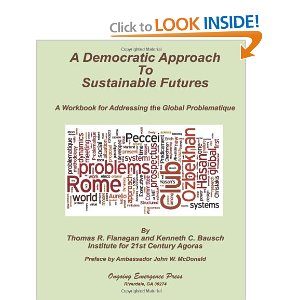
Thomas R. Flannagan, Kenneth C. Bausch
QUOTE (viii): This is the book to prepare for the messy multi-layered, multi-faceted, personal, political real world of applied activism.

Thomas R. Flannagan, Kenneth C. Bausch
QUOTE (viii): This is the book to prepare for the messy multi-layered, multi-faceted, personal, political real world of applied activism.
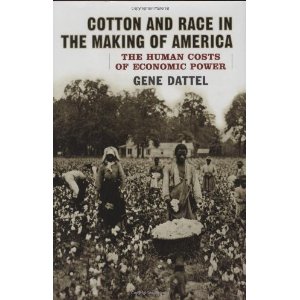
Gene Dattel
5.0 out of 5 stars Now I Better Understand What It Was All About,June 10, 2010
By Richard P. Canon (Spartanburg, SC United States) – See all my reviews
Being a proud fifth-generation Southerner, I thought that I fully understood why the Civil War was fought. Most of my understanding was based upon the influence of society and culture within which I grew up. Although none of my family were flag flying Confederates, there was very much pride in being a Southerner and having ancestors who fought for the Confederacy.
After reading this book, I honestly believe that I better understand why the Southerners did what they did. Within my lifetime I have been told over and over that the war was fought over the issue of slavery. As this book shows, slavery was at the root of the war. The primary issue of the war, however, was pure economics.
Continue reading “Review (Guest): Cotton and Race in the Making of America”
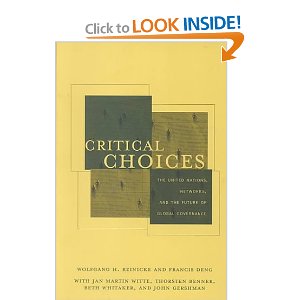
Wolfgang H. Reinicke (Editor), Francis Deng (Editor), Jan Martin Witte (Editor), Thorsten Benner (Editor), Beth Whitaker (Editor), John Gershman (Editor)
5.0 out of 5 stars Global Hybrid Network Governance Primer for UN+, July 21, 2011
By Robert D. Steele (Oakton, VA United States) – See all my reviews
Last week I reviewed the first book on this topic by the first author (Wolfgang Reinicke), Global Public Policy: Governing Without Government. I overlooked that book published in 1998, and this book in 2000, for lack of consciousness. Evidently others did as well given the lack of reviews. What makes both these books even more important now is the appointment of the primary author, Wolfgang Reinicke, to the position of inaugural dean of the school of public policy at the Central European University founded and richly endowed by George Soros. To understand how much George Soros has broken away from the government-financial crime axis, his essay free online and also the first fifty-seven pages of The Philanthropy of George Soros: Building Open Societies is essential reading.
I read this book at three levels: for content on its merits; for insight into the specific individuals and agencies behind the book; and for insight into where George Soros might be hoping that Dean Reinicke will go with network governance, what some of us call Panarchy, which is rooted in what we call M4IS2 (Multinational, Multiagency, Multidisciplinary, Multidomain Information-Sharing and Sense-Making). In other words, secrecy is out, transparent true cost information about everything is in–transparency breeds truth, truth breeds trust, and this is how we achieve a non-zero prosperous world at peace that works for all, not just the top 1%.
On page 91 one finds a quote better suited to the front matter, from Kofi Annan:
QUOTE (91): The United Nations once dealt only with governments. By now we know that peace and prosperity cannot be achieved without partnerships involving governments, international organizations, the business community, and civil society.
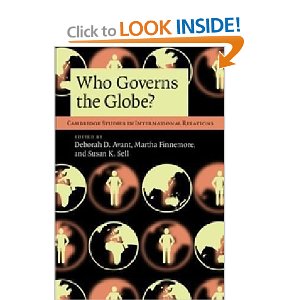
“This path-breaking collaborative work illuminates complex social and political relationships that constitute governing authority in a changing world. New questions provoke deeper reflection than the term ‘global governance' typically stimulates. Specialists need to read this fine book, and so do students.” Louis W. Pauly, Canada Research Chair in Globalization and Governance, University of Toronto
“This volume makes and illustrates an important fact about global governance today: it isn't only or always the institutional form of actors – be they states, corporations, or NGOs – but their relationships with key constituencies and with one another that shape governance outcomes. Authority, the essence of governance, comes in many guises. I recommend this book highly.” John Gerard Ruggie, Harvard University
Academics and policymakers frequently discuss global governance but they treat governance as a structure or process, rarely considering who actually does the governing. This volume focuses on the agents of global governance: ‘global governors'. The global policy arena is filled with a wide variety of actors such as international organizations, corporations, professional associations, and advocacy groups, all seeking to ‘govern' activity surrounding their issues of concern. Who Governs the Globe? lays out a theoretical framework for understanding and investigating governors in world politics. It then applies this framework to various governors and policy arenas, including arms control, human rights, economic development, and global education. Edited by three of the world's leading international relations scholars, this is an important contribution that will be useful for courses, as well as for researchers in international studies and international organizations.
Conference: Who Governs the Globe?
November 16 & 17, 2007

Nathan A. Allen
![]() Six Star Pre-History Ignored Until Now, July 17, 2011
Six Star Pre-History Ignored Until Now, July 17, 2011
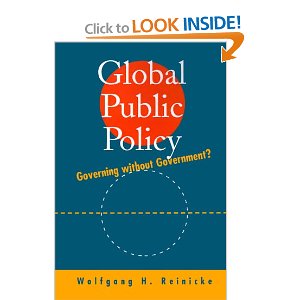
Wolfgang Reinicke
This is a pioneering work, easily a decade ahead of other world-class efforts, my favorite being that of (then) World Bank Vice President for Europe, J. F. Rischard, High Noon 20 Global Problems, 20 Years to Solve Them. It has been largely over-looked, but should gain additional importance, along with the author's additional book, Critical Choices. The United Nations, Networks, and the Future of Global Governance, now that George Soros is sponsoring the Central European University (CEU), and within that university, the author Wolfgang Reinicke has been appointed the inaugural dean of CEU's School of Public Policy and International Affairs. In the context of the essay by George Soros, the first 57 pages of The Philanthropy of George Soros: Building Open Societies, and the now hardened disenchantment with the nation-state system for being ignorant, biased, and non-agile (these and other deficiencies are marvelously articulated by Professor Philip Allot of Cambridge in The Health of Nations: Society and Law beyond the State, one can surmise that Dean Peinicke will seek to focus on integrationist endeavors that demand transparency and accountability for multiple stakeholders in return for stability and mutual gain.
Continue reading “Review: Global Public Policy – Governing Without Government?”
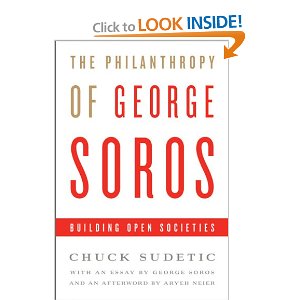
UPDATE 30 June to add link to Notes on, and Video of George Soros and Aryeh Neier discussing the theme. See also his full essay online with comment: George Soros Nails It: Intelligence with Integrity
Chuck Sudetic
On its own merits, without the Foreword from George Soros, this book is a solid five. With the most extraordinary Foreword, a Foreword that draws the lines of battle between a totally dysfunctional global governance and financial system of systems all lacking in integrity–where truth is not to be found–and the need for transparency, truth, and trust, the book goes into my top 10%, 6 stars and beyond.
The essay is a *major* part of the book, the first 57 pages out of just over 335. The essay is available free online and is a “must read” item for any person who wishes to be part of restoring the Republic and laying the foundation for creating a prosperous world at peace. Searching for <George Soros My Philanthropy> will lead directly to both the New York Review of Books and the GeorgeSoros.com offerings–select the latter to get the full article without subscription nonsense from the New York Review of Books.
I confess to having lost faith in George Soros–he fell for the Barack Obama Show and wasted a lot of time and money on what ends up being the Goldman Sachs Show–to the point that Goldman Sachs not only continues to own the Secretary of the Treasury, but now has installed its own man in the role of National Security Advisor. The irony does not amuse me.
This essay is phenomenal, and bears on the book at large, because Soros has finally put his finger of the sucking chest wound that I, John Bogle, William Grieder, and most recently Matt Taibbi have been sounding the alarm on: the lack of intelligence and integrity in the system of systems. Soros is halfway there; he is now outside the system looking in, and that is good news for all of us.
“I am looking for novel solutions in order to make an untidy structure manageable.”
Continue reading “Review: The Philanthropy of George Soros – Building Open Societies”